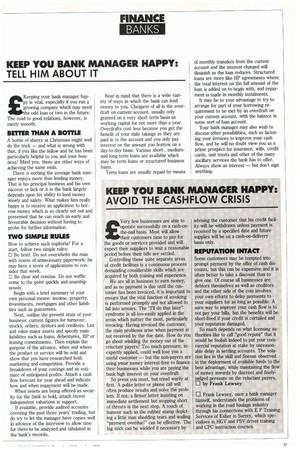KEEP YOU BANK MANAGER NAPPY:
Page 39

If you've noticed an error in this article please click here to report it so we can fix it.
TELL HIM ABOUT IT
ethKeeping your bank manager happy is vital, especially if you run a growing company which may need e odd loan or two in the future. The road to good relations, however, is rarely smooth.
BETTER THAN A sarru
A bottle of sherry at Christmas might well do the trick — and what is wrong with that, if you like the fellow and he has been particularly helpful to you and your business? Mind you, there are other ways of achieving the same ends.
There is nothing the average bank manager enjoys more than lending money. That is his principal business and his own success or lack or it in the bank largely depends upon his ability to lend money wisely and safely. What makes him really happy is to receive an application to borrow money which is so clearly set out and presented that he can reach an early and favourable decision without having to probe for further information.
TWO SIMPLE RULES
How to achieve such euphoria? For a start, follow two simple rules: 0 Be brief. Do not overwhelm the man with reams of unnecessary paperwork: he may have a score of applications to consider that week.
0 Be clear and concise. Do not waffle: come to the point quickly and unambiguously.
Begin with a brief summary of your own personal means: income, property, investments, mortgages and other liabilities such as guarantees.
Next, outline the present state of your business: current figures for turnover, stocks, orders, debtors and creditors. List and value major assets and specify main liabilities such as loans, debentures, HP or leasing commitments. Then explain the purpose of the advance, when and where the product or service will be sold and show that you have researched both marketing and competition. Provide a breakdown of your costings and an estimate of anticipated profits. Attach a cash flow forecast for year ahead and indicate how and when repayment will be made.
When assets are being offered as security for the bank to hold, attach recent independent valuations in support.
If available, provide audited accounts covering the past three years trading, but do try to let the manager have copies well in advance of the interview to allow time for them to be analysed and tabulated in the bank's records. Bear in mind that there is a wide variety of ways in which the bank can lend money to you. Cheapest of all is the overdraft on current account, usually only granted on a very short term basis as working capital for not more than a year. Overdrafts cost less because you get the benefit of your daily takings as they are paid in to the account and you only pay interest on the amount you borrow on a day-to-day basis. Various short-, mediumand long-term loans are available which may be term loans or structured business loans.
Term loans are usually repaid by means of monthly transfers from the current account and the interest charged will diminish as the loan reduces. Structured loans are more like HP agreements where the total interest on the full amount of the loan is added on to begin with, and repayment is made in monthly instalments.
It may be to your advantage to try to arrange for part of your borrowing requirement to be met by an overdraft on your current account, with the balance in some sort of loan account.
Your bank manager may also wish to discuss other possibilities, such as factoring your invoices to improve your cash flow, and he will no doubt view you as a prime prospect for insurance, wills, credit cards, unit trusts and other of the many ancillary services the bank has to offer. Always show an interest — but don't sign anything.
































































































